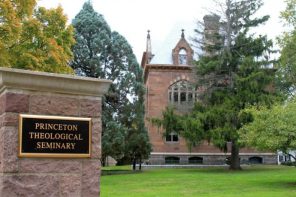“Marginalized” was the word Religion News Service columnist Jonathan Merritt used to describe the treatment of NYC celebrity pastor Tim Keller after Princeton Theological Seminary rescinded his Abraham Kuyper Prize for Excellence in Reformed Theology and Public Witness this week.
The decision to not give Keller, Redeemer Presbyterian Church founder and prolific church planter, the award came after an outcry from many PTS students, faculty and alumni who felt honoring the conservative theologian ran counter to the mission of the PCUSA seminary and showed disregard for its women and LGBT students. (As a neo-Calvinist, Keller objects to the ordination of women and LGBT people.)
In his column, Merritt wrote:
If Christians like Tim Keller are unworthy of honor and deserve to be marginalized, American Christianity is in serious trouble.
He kept using that word “marginalized,” but to quote Inigo Montoya, I don’t think it means what he thinks it means? He later walked back his eyebrow-raising choice via Twitter, saying different wording “might have been more appropriate.”
But the blunder was evidence of a growing trend to cry “oppression” when the opinions of influential white men in highly esteemed positions are called into question, or claim “bullying” when actually marginalized groups respond with anything outside of capitulation.
When PTS originally announced its intention to bestow the award to Keller along with a $10,000 cash prize, second-year seminarian, Zachary Calvo, authored a petition with approximately 300 signatories from the PTS community protesting the choice. The letter stated Keller’s “exclusionary and prohibitive stances on the ordination of women and LGBTQ persons” was incongruous with the seminary’s values.
In a phone interview, Calvo, who sits on the board of PTS’s Bisexual, Gay, Lesbian, and Straight Supporters, said that “there was a lot of anger, a lot of disappointment among women and LGBT students and faculty.”
“I’m training in ministry because I believe that regardless of your theological position you are worthy of dignity. However, that doesn’t mean your exclusionary values won’t go unchallenged.”
He went on further to say he felt Merritt mischaracterized the student group’s effort. The signatories only took issue with awarding the megachurch preacher, they did not object to Keller being given a platform to speak on campus—which Keller will still be doing on April 6.
“We spent a lot of time making our argument precise, and we never said we didn’t want dialogue or we didn’t want him here. We said we were extremely concerned with what awarding Keller $10,000 communicates about the values of this institution. At no point has this been about policing free speech. I feel many outlets didn’t do due diligence and jumped to huge assumptions about the meaning of our statement.”
Given the ire many conservative Christians have expressed on social media and in blogs in the wake of the seminary revoking the award, it appears the intent of the painstakingly worded letter was overlooked. Many seem to be conflating the award’s revocation with censorship.
The tyranny of the totalitarian Left.
Princeton Seminary Bows to Protest, Revokes Award for Tim Keller https://t.co/DZZYCoMm18
— Dale Hurd (@DaleHurd) March 24, 2017
When diversity of thought becomes a tool to silence those you disagree with, it's not diversity you're after. @ptseminary @timkellernyc
— David Fairchild (@David_Fairchild) March 23, 2017
@ptseminary this is a decision rooted in political correctness ahead of biblical truth. Discussion is a part of the church. Poor decision.
— Ryan Abernathy (@absonjourney) March 22, 2017
William Stell, a recent PTS alum who is now a PCUSA pastor in New Jersey and identifies as gay, also agrees that many are making a false equivalency between refusing to honor someone and silencing them.
“[The revocation] was an appropriate gesture because it’s barely been a decade since our seminary affirmed the call of God in all of its students, regardless of gender or sexual orientation. It’s not about voices not being heard because Keller will be heard regardless. It’s about the voices PTS celebrates.”
Then there’s the deeper question of why a seminary described as moderate has an award named after Abraham Kuyper to begin with, a reactionary anti-modernist who held rather unfortunate views on race and gender to put it mildly and was one of the architects of apartheid in South Africa. Several people tweeted sarcastically that even Kuyper would be “too conservative” to qualify for his namesake award, and it would appear that they’re correct.
A member of the PTS faculty I corresponded with expressed the issue was not so much with Keller receiving the award but more with there being a Kuyper award at all. Institutions with storied histories such as PTS are always walking a tightrope between paying tribute to their legacies but also respecting a diverse student body.
“I saw this award as an attempt to be ‘all things to all people,'” says Jasmin Figueroa, a PTS student in her final year and the Intersectionality Chair of the seminary’s Women’s Center, via email.
“It wants to honor its history, but that often means honoring the legacy of problematic theologians. It wants to honor its marginalized students, but that requires repenting from the ways that it is complicit in honoring theologies that have contributed to oppression.”
A similar situation happened at Yale just last month when, after pressure from students, the university renamed its Calhoun College due to John C. Calhoun’s support of slavery as a “positive good.” Also last fall at the Jesuit Georgetown, the president made an unprecedented move to atone for the role Georgetown once played in the slave trade by offering preferential status in admissions to descendants of slaves.
This is something that older institutions will have to deal with as the younger generations entering their hallowed halls become more and more social justice-oriented. These increasingly progressive cohorts often force their colleges and seminaries to reconcile their egalitarian missions with oppressive pasts.
In honoring Keller for his “urban mission,” it’s easy to forget the work of not-as-visible clergy, activists and scholars—many of them women or people of color or queer—who have been active in these communities for years to little fanfare. Keller’s supporters love to lionize him and his Redeemer Presbyterian Church, but one rarely sees discussion on how Keller’s rise to the spotlight in NYC might have come at the expense of less societally privileged pastors and theologians who wouldn’t have been given the same exposure or resources. Is the hero worship surrounding Keller just a Reformed rendition of the white savior coming to redeem the big, bad inner cities?
Figueroa says women of color seminarians like herself have often had to resist the teachings of theologians like Keller who “seek to delegitimize their God-given calls.”
“Keller […] uses rhetoric about ‘saving’ the cities, ignoring the hundreds of churches that have been ministering in NYC for generations. These teachings disempower POC—some of whom are women and/or queer—who live in these cities. Many of us are taught that Keller, et. al. are the theological authorities, and we’re never introduced to theologians who are representative of our backgrounds.”
When asked about Merritt’s use of the word “marginalized” and the dominant narrative among some conservative Christians like Eric Metaxas who feel Keller is being “bullied,” Figueroa was incredulous:
“Keller? The guy with a platform and money and prestige and influence? One of the biggest theological influencers in the evangelical and Reformed worlds? I’m sure that he’s not going to miss that $10,000, and there’s certainly not a shortage of platforms for him. And PTS isn’t even denying him that.”





